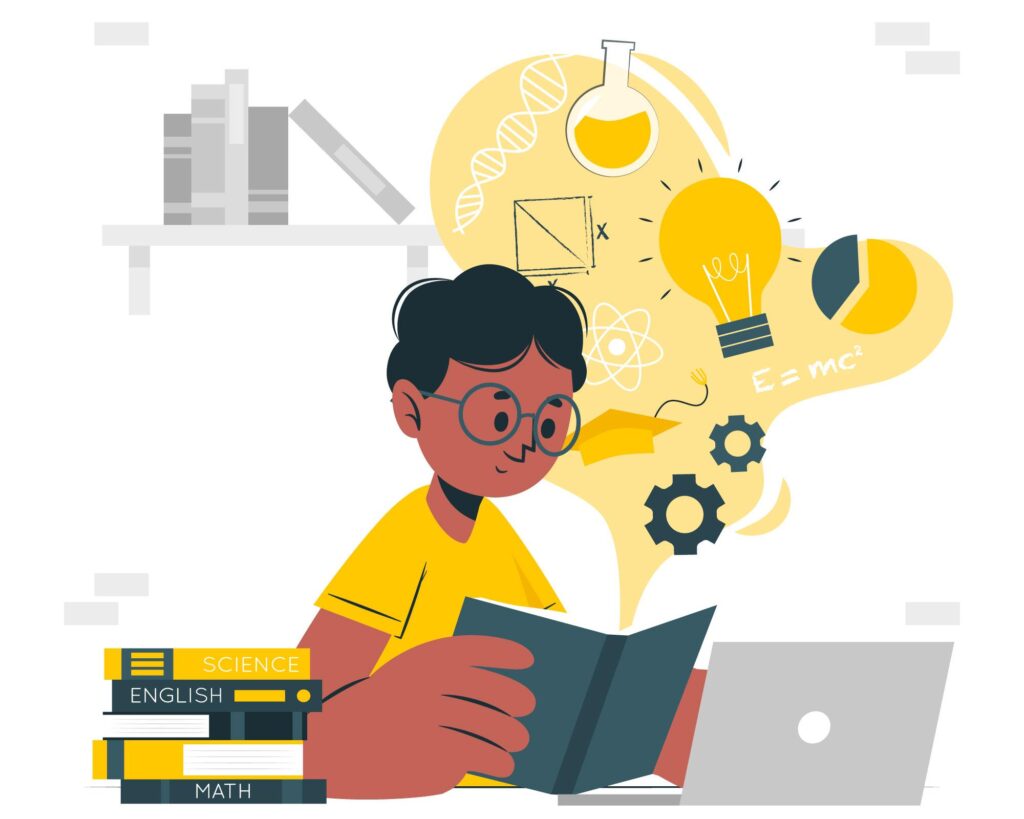Do you have problems with comprehending what you’ve been taught? Academic learning and personal development require a mastery of the skills and techniques of efficient studying and learning.
How to Study and Understand to Get Good Grades

1. Choose a calm and brightly lit environment
Students need a good environment that will enhance their concentration and provide the right ambiance for learning. Find a place where there will be minimal disturbance, whether from the outside environment, other people or anything as diverse as a library, a specific study room or even a corner of a house. It would help if you made sure the area is adequately lit, if natural light is possible so that there would be minimized eye strain and tiredness.
Proper lighting also assists in avoiding fatigue and headaches that may arise during prolonged study sessions. If light from a natural source is a problem, you may have to consider getting a desk lamp with an adjustable light intensity. Proper environment creates the background which favors study and deeper understanding.
2. Minimize distractions
Interference can so much hinder concentration and understanding, study and recall of ideas. Begin by defining your usual interferences, which may include notifications of social networks, received messages, or other sounds and noises. Silence notifications on your gadgets or download apps that prevent you from accessing ‘’boring’’ sites that distract you during study time. Organize your study space so that you do not have distractions around that you can see. If you make a special area free of interruption, the attention and focus on the material you require will be significantly higher.
3. Write down in your own words
Paraphrasing information in one’s own words is one of the most efficient techniques of knowledge assimilation and quick understanding. Instead of typing out the same thing as what has been written, try to grasp the idea and then put it into your own words. This process makes one take more time on the material and most often one finds out missing information. Organize your notes using strategies such as the Cornell method or the mind map. For retention purposes as well as providing yourself with a study aid, ensure that you revise these notes frequently in order to reinforce what you have learned.
4. Read and ask questions
Questioning is a good strategy when it comes to dealing with the text and how to study and understand. Questions that can be asked when reading include, “What does this mean?” “How does this relate to something I know?” and “What evidence is there for this?” This strategy assists you in focusing your mind by allowing you to identify areas or topics that require further clarification. It also fosters critical thinking and enhances understanding of the course’s content and information. Remember to write down some questions to make sure you do not forget about them if you need to make further research or if they are to be discussed.
5. Use acronyms and acrostics
Employing tools like acronyms and acrostics come in handy when it comes to having an understanding of things. An acronym uses the first letter of each word in a phrase to create a memorable word (e. g. , “HOMES” for the Great Lakes: Huron, Ontario, Michigan, Erie and Superior are some of them). An acrostic is a phrase in which every work starts with the letter or the set of letters which is being memorized—for instance, EGBDF for the lines of the musical clef. For the ideas that you want to remember, or the list of points that should be memorized, create the acronyms and the acrostics of the words on your own. The procedure of creating these devices has the potential to explicate and improve the understanding of them.
6. Test yourself
Despite being a relatively simple practice, self-testing is one of the most effective strategies of how to study and understand. One’s own questions should be set aside to test one’s knowledge of the information being studied. This can be in the form of flash cards, solving as many problems as you can, or just reviewing through questions without looking at your notes. Self-testing does not only assist in the recall of information but also increases confidence on what one has learnt. It also helps reduce what is called the ‘illusion of competence’ which results from re-reading the notes or textbooks.
7. Try to explain it to a friend
When you have to talk about what some idea means to someone else, a number of things happen: you get a clearer understanding of the idea, reduce complexity, avoid getting confused by your own language, and prepare yourself for counter questions. It makes for one to learn other things that one did not know before; this, in most cases, creates a gap that leads to learning. If you don’t have someone to teach it directly, then try to grab an imaginary board and teach that particular concept or record yourself while teaching. This technique is called the “protégé effect,” and it can help improve learning and recall to a great extent.
8. Learn for a few minutes and then rest
The Pomodoro technique is a non-conventional method of managing time that would be perfect for use when studying. It requires a focused effort for a specific time (usually 25 minutes), then a break of a smaller duration (5 minutes). This approach keeps one alert and does not get one bored; hence, this approach is preferred. Though you are studying, pay a lot of attention to the task ahead of you. During the breaks, do not engage in work-related activities but instead, rest, take a walk or do something which you would like. Essentially, this pattern of concentrated work followed by breaks enables one to study more effectively or acquire more profound knowledge of material in the course of time.
9. Listen to podcasts or audiobooks
This means auditory learning can be particularly useful as an additional source of information and as a way to use your time when you are unable to read or watch videos, for instance, when you travel or exercise. It is also possible to find most textbooks as audiobooks and there are a great many educational podcasts on various topics. This way you gain new insight and also enhance ideas from what other experts are saying on the issue. Pay attention, write down what is being said, pause and assess what you are being told against what you already know.
10. Get adequate sleep
Sleep is an essential feature of cognitive functions, which includes learning and memory consolidation. Do not forget to get about 7-9 hours of sleep every night. At night, while we are asleep, the brain processes new knowledge that is given to the brain during the day and sorts it out in accordance with the place it is in the large base of knowledge.
Lack of sleep has effects such as fatigue in that it hampers concentration, weakens problem-solving abilities and provokes underachievement. Set and adhere to a routine sleep schedule and construct daily behaviors that result in sleep. Screens should be avoided an hour before sleeping as it disrupts the natural sleep-wake cycle due to blue light.
11. Eat a balanced diet
It is highly emphasized that proper feeding should be followed because food is essential for the components of the brain and for learning. The good foods to take include proteins, carbohydrates, especially the complex ones, good fats and vitamins and mineral-rich foods. Other foods you should include are those that are rich in omega 3 fatty acids, which are found in fish, walnuts, and flaxseed among others are very crucial in the enhancement of the brain. Take lots of water when you are studying and throughout the day, as this will assist you a lot during the studying and understanding of it. You should also avoid consuming too much caffeine or sugar because they are usually bad for your energy. It is recommended that you take several small meals in a day because when you are studying for a number of hours, the energy level should be kept high.
12. Identify areas of improvement
That is why self-monitoring is one of the most important aspects of learning. During or after each study session or test, spend some time and evaluate the positives as well as the areas that require adjustment. Do not hide your weakness, whether it’s personality or emotional problems, from yourself. To find out areas of knowledge that need to be filled, consider using techniques such as practice tests or feedback from instructors. After you have been able to determine the issues that require correction, come up with measures on how to correct them. This might mean spending more time on some areas, looking for other materials, or choosing different approaches to studying.
13. Celebrate your success
It is useful to recognize the accomplishments, no matter how insignificant those accomplishments are, in order to prevent the development of a negative outlook in relation to learning. Develop a good target plan and ensure you have a way of encouraging yourself once you reach a certain achievement. Any form of celebration can do—it could be as informal as taking a break, eating something you love or even informing somebody about achieving your goal. Rewarding progress strengthens confidence and helps convey the relationship between hard work and achievement. Do not forget to embrace the process of learning instead of focusing only on the results, such as marks on the papers.
Conclusion
Some people are not born with the ability to know how to study and understand immediately. This is why it is important to understand that it is a skill that is mastered through practice. Given these practices, it is possible to improve the learning process and increase the effectiveness of knowledge retention and application of any type of content. Please remember that, because each person has his or her own individual approach to learning, try many techniques on yourself and select the most useful ones. If you keep on practicing and being consistent, you will surely increase your learning efficiency and effectiveness.


